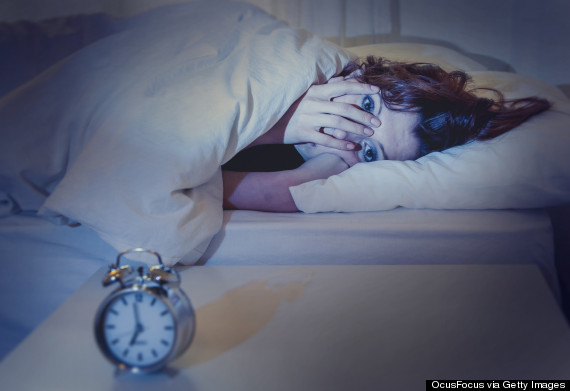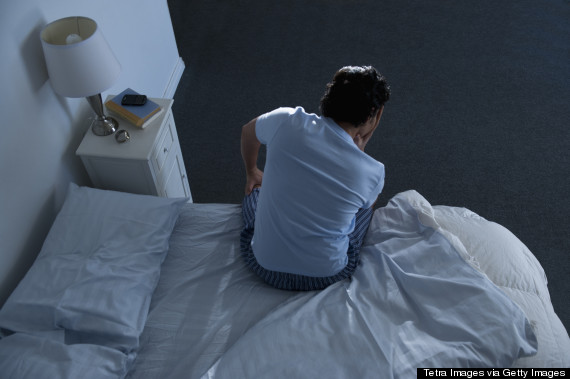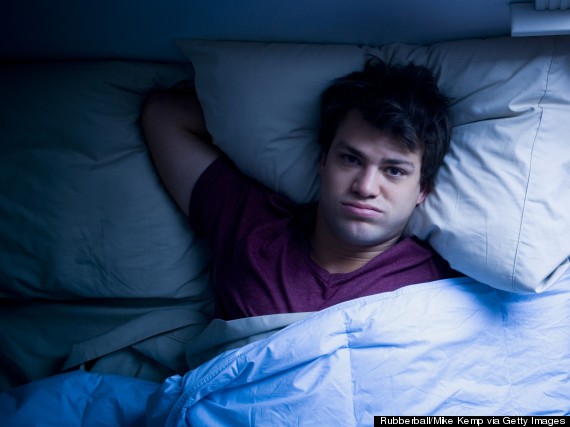
The presence of stress in our lives has the tendency to be a "you can run but you can't hide" sort of deal. We all go through it, whether it's brought on by our jobs, our personal lives or even just terrible traffic. Stress may be inevitable, but that doesn't mean we should just let it happen. It can take a serious toll on our everyday functions -- especially catching those Zzs.
When we're stressed, our minds race with thoughts instead of shutting down at night, inhibiting important functions involved in memory, muscle repair and mood (yikes). When we don't get enough sleep, our immune system falters just as much as when we're stressed. But those aren't the only things put out of whack. Below are five ways stress affects our sleep and health -- and what we can do to fix it.
First and foremost, stress prevents you from logging adequate hours.
Stress has a way of making us toss and turn -- and those restless hours add up. According to the American Psychological Association's Stress in America survey, 43 percent of adults say that stress causes them to lie awake at night, and more than 50 percent of adults report feeling sluggish or lazy after a night of little sleep.
While there is no magic number of sleep hours we should log per night (experts recommend anywhere from seven to nine hours), research suggests that Americans would be happier and healthier overall if they at least got an extra 60 to 90 minutes per night, according to the APA. And the bottom line is, we can't log that time when we're too busy ruminating over our anxieties.
It messes with the quality of sleep.
Not only is stress stealing precious hours of sleep, but it also screws up shut-eye satisfaction. Approximately 42 percent of adults report getting only fair or poor quality sleep when they're stressed, according to the same Stress in America survey.
Stress could up your insomnia risk.
Bad news for the chronically worried: Stress may not just negatively affect some of your sleep, it may rob you of sleep entirely. Those who experience ongoing stress are more susceptible to insomnia, and each additional stressor increases the risk for the disorder by 19 percent, according to recent research published in the journal SLEEP.
It sends your brain into overdrive, preventing you from drifting off.
When you fall asleep, your body switches from its active sympathetic nervous system to the calmer parasympathetic nervous system. However, this gets interrupted with stress. When you're overly worried, the sympathetic nervous system doesn't shut down, and your brain remains hyperactive, David Spiegel, M.D., the director of the Center on Stress and Health at Stanford University, previously told HuffPost Healthy Living, leaving you wide awake.
It creates a vicious cycle.
If you're not careful, stress can be a catalyst for a vicious cycle of sleepless nights: You're stressed, so you can't sleep, then your lack of sleep makes you more stressed, and so on. According to the Anxiety and Depression Association of America, nearly three-fourths of adults say that their stress-induced sleep problems have caused an increase of stress or anxiety in their lives.
So how do we prevent stress from wrecking our shut-eye? Try some of the science-backed sleep tricks below.

Smell some lavender.
Studies have shown that the floral scent relaxes the body and can even help with insomnia.
Practice relaxation techniques.
Whether it be a few yoga poses, progressive relaxation or meditation, engaging in a few calming exercises before bed can help quiet your mind so you can drift off to dreamland.
Discard your thoughts.
Grab a pen and paper and write down what you're feeling -- then physically throw them away. Research shows this trick will help clear your mind of negative thoughts. A clear mind = a more sleep-ready mind.
Take some deep breaths.
If specific exercises aren't your thing, try just taking a few deep breaths before you nod off. The inhalation and exhalation activates the body's naturally-calming parasympathetic system.
Consider seeing a sleep specialist.
If absolutely nothing works, it might be helpful to seek insight from a professional. Therapists can help you sort through stress, as well as employ techniques like cognitive behavioral therapy to address insomnia.
This GPS Guide is part of a series of posts designed to bring you back to balance when you're feeling off course.
GPS Guides are our way of showing you what has relieved others' stress in the hopes that you will be able to identify solutions that work for you. We all have de-stressing "secret weapons" that we pull out in times of tension or anxiety, whether they be photos that relax us or make us smile, songs that bring us back to our heart, quotes or poems that create a feeling of harmony or meditative exercises that help us find a sense of silence and calm. We encourage you to visit our other GPS Guides here, and share with us your own personal tips for finding peace, balance and tranquility.